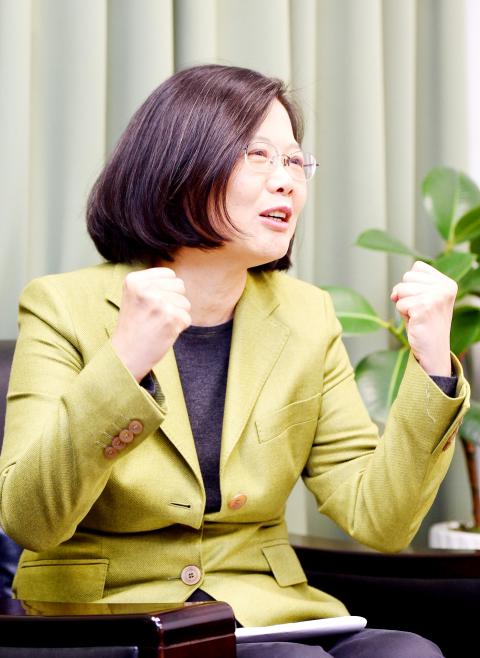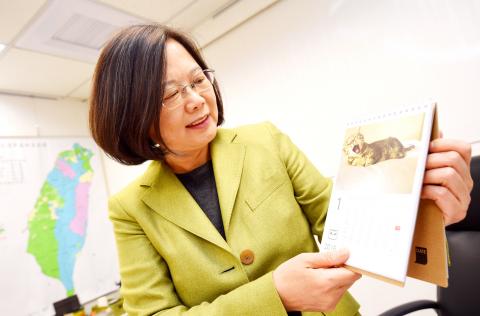Liberty Times (LT): Many people believe that cross-strait relations will be the Democratic Progressive Party [DPP] administration’s biggest challenge. The administration of Ma Ying-jeou (馬英九) based its cross-strait policy on the so-called “1992 consensus” [the existence of which the DPP denies]. However, your policy is to “maintain the status quo.” How will you obtain China’s understanding while truly maintaining the “status quo”?
Tsai Ing-wen (蔡英文): The results of this election demonstrate that maintaining the “status quo,” which is my policy, is the mainstream view of Taiwanese. Maintaining peace in the Taiwan Strait and the stable development of the cross-strait relationship are the common wish of all groups concerned.
However, that responsibility is not unilateral. Both sides must work to build a consistent, predictable and sustainable cross-strait relationship.

Photo: Lo Pei-der, Taipei Times
On the evening of the ballot count, I said in the news conference that I would use the Republic of China’s [ROC] constitutional institution, the results of bilateral negotiations, talks and exchanges, and the democratic will expressed through the democratic principle as the basis for developing cross-strait relations.
I reiterate as president-elect that, when the new administration is inaugurated on May 20, it will be based on the constitutional institution of the ROC; it will act from a vantage point that transcends partisanship; it will follow Taiwan’s most recent democratic will and the most commonly shared consensus; and pursuit of the perpetuation of a peaceful and stable “status quo” in cross-strait relations will be grounded on the common interest of the people.
In 1992, the two parties [the Straits Exchange Foundation and China’s Association for Relations Across the Taiwan Straits] from the two sides communicated and negotiated through an approach of mutual understanding and “seeking common ground while shelving differences,” and I understand and respect this historical fact.

Photo: Lo Pei-der, Taipei Times
I also believe that since 1992, there have been 20 years of bilateral exchanges and negotiations that accumulated [contributions to] the “status quo” and accomplishments, which both sides are to protect and maintain.
It is on this basic fact and established political basis that peace, stability and development in cross-strait relations will be promoted.
LT: You just mentioned “political basis.” What is this political basis comprised of? How is it different from that of the Ma administration’s?
Tsai: The “established political basis” I mentioned has several key components.
First, there was a bilateral summit in 1992 as a matter of historical fact and there was a mutual cognizance of “seeking common ground while shelving differences.”
Second, the ROC constitutional institution as it exists now.
Third, the results of 20 years of bilateral negotiations and exchanges.
Fourth, Taiwan’s democratic principle and democratic will.
Taiwan is a democratic society. The democratic will and democracy are the twin pillars of the government’s cross-strait policy.
If the government’s policy deviates from the democratic will and democracy, it would not be sustainable and might even lose the support of the people.
We insist on obeying the democratic will and the democratic principle and we insist on ensuring the freedom of Taiwanese in the right to choose their future. This is the most significant difference between the new administration and the Ma administration.
Translated by Jonathan Chin

DAREDEVIL: Honnold said it had always been a dream of his to climb Taipei 101, while a Netflix producer said the skyscraper was ‘a real icon of this country’ US climber Alex Honnold yesterday took on Taiwan’s tallest building, becoming the first person to scale Taipei 101 without a rope, harness or safety net. Hundreds of spectators gathered at the base of the 101-story skyscraper to watch Honnold, 40, embark on his daredevil feat, which was also broadcast live on Netflix. Dressed in a red T-shirt and yellow custom-made climbing shoes, Honnold swiftly moved up the southeast face of the glass and steel building. At one point, he stepped onto a platform midway up to wave down at fans and onlookers who were taking photos. People watching from inside

A Vietnamese migrant worker yesterday won NT$12 million (US$379,627) on a Lunar New Year scratch card in Kaohsiung as part of Taiwan Lottery Co’s (台灣彩券) “NT$12 Million Grand Fortune” (1200萬大吉利) game. The man was the first top-prize winner of the new game launched on Jan. 6 to mark the Lunar New Year. Three Vietnamese migrant workers visited a Taiwan Lottery shop on Xinyue Street in Kaohsiung’s Gangshan District (崗山), a store representative said. The player bought multiple tickets and, after winning nothing, held the final lottery ticket in one hand and rubbed the store’s statue of the Maitreya Buddha’s belly with the other,

‘NATO-PLUS’: ‘Our strategic partners in the Indo-Pacific are facing increasing aggression by the Chinese Communist Party,’ US Representative Rob Wittman said The US House of Representatives on Monday released its version of the Consolidated Appropriations Act, which includes US$1.15 billion to support security cooperation with Taiwan. The omnibus act, covering US$1.2 trillion of spending, allocates US$1 billion for the Taiwan Security Cooperation Initiative, as well as US$150 million for the replacement of defense articles and reimbursement of defense services provided to Taiwan. The fund allocations were based on the US National Defense Authorization Act for fiscal 2026 that was passed by the US Congress last month and authorized up to US$1 billion to the US Defense Security Cooperation Agency in support of the

‘COMMITTED TO DETERRENCE’: Washington would stand by its allies, but it can only help as much as countries help themselves, Raymond Greene said The US is committed to deterrence in the first island chain, but it should not bear the burden alone, as “freedom is not free,” American Institute in Taiwan Director Raymond Greene said in a speech at the Institute for National Defense and Security Research’s “Strengthening Resilience: Defense as the Engine of Development” seminar in Taipei yesterday. In the speech, titled “Investing Together and a Secure and Prosperous Future,” Greene highlighted the contributions of US President Donald Trump’s administration to Taiwan’s defense efforts, including the establishment of supply chains for drones and autonomous systems, offers of security assistance and the expansion of